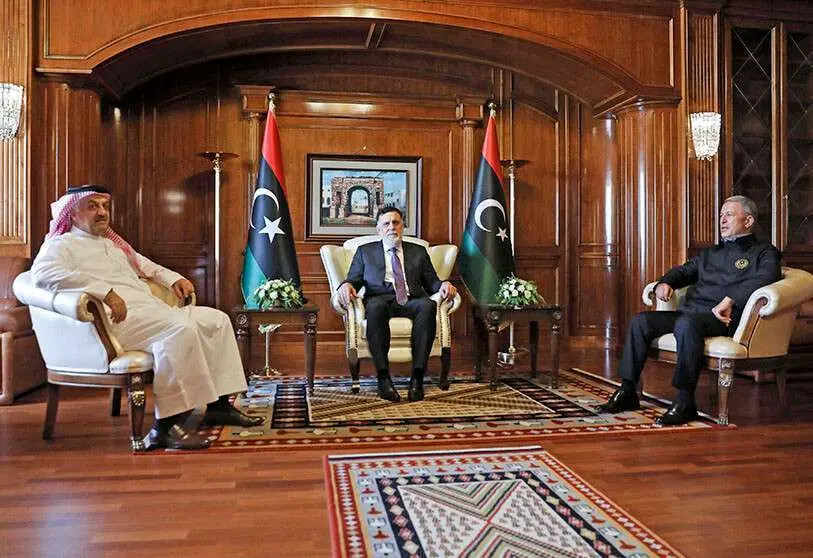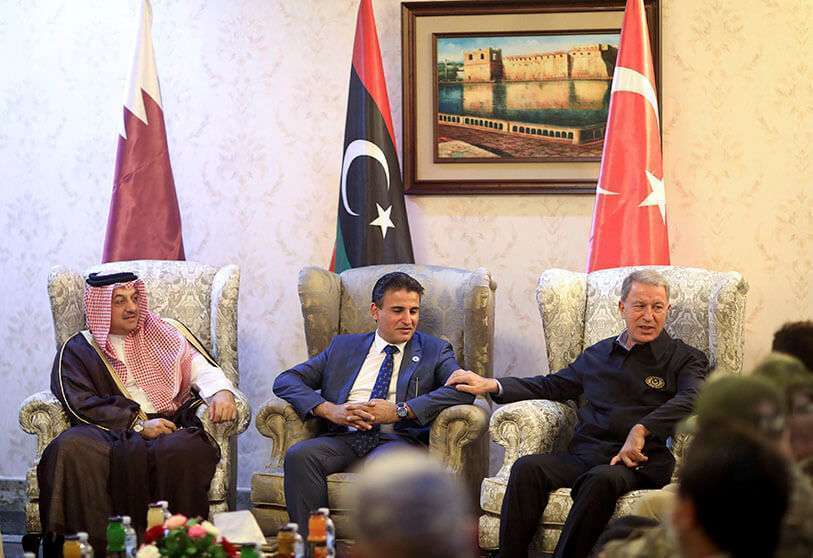Qatar and Turkey's interests in North Africa

Qatar and Turkey continue to show interest in North Africa, especially with the current conflict in Libya. The last meeting of the Turkish and Qatari Defence Ministers, Hulusi Akar and Khalid bin Mohammed al-Attiyah respectively, with the Prime Minister of the Libyan Government of National Accord (GNA), Fayez Sarraj, has shown the importance that the Gulf country and Eurasia attach to the North African area.
The Ottoman nation and the Gulf monarchy are taking part in Libya's civil war in favour of the GNA, especially after the agreement at the end of last year signed by Fayez Sarraj and Recep Tayyip Erdogan, the president of Turkey, which ensured Turkish military assistance and distributed economic zones in the Mediterranean arc, where Turkey has its sights set on the exploitation of gas and oil. Within the Libyan war conflict, there is now speculation about the preparations for the battle of Sirte, an important enclave in the north of Libya that could represent a turning point in the war between the GNA and the Libyan National Army (LNA), The latter is linked to Tobruk's other eastern executive and receives external support from Saudi Arabia, Egypt, Bahrain (these major rivals of Qatar, which has been under embargo since 2017), France and Russia. Precisely, Cairo had set Sirte as an inviolable red line that if touched would provoke the intervention of the powerful Egyptian Army.
Haftar's forces had the situation pretty much under control since the last offensive launched on April 4, 2019 on the capital of Tripoli, a stronghold of the GNA (supported since 2016 by the United Nations), but the Turkish intervention has reversed the situation and the militias associated with Sarraj have regained a lot of ground and important enclaves such as Sabratha, Sorman and Al-Watiya airport. Armed groups including paid mercenaries linked to groups formerly linked to terrorist entities such as Al-Qaeda and Daesh, sent from Syria by Turkey, which is also involved in the Syrian civil war with these elements, as has been reported in the media. All this with the financial support of the Qatari country led by Emir Tamim bin Hamad al-Thani. In this sense, the blockade suffered by Qatar since 2017 imposed by the Saudi, Egyptian and Bahraini nations was motivated by the fact that these countries denounced the Gulf monarchy for supporting cross-border terrorism. The Libyan and Turkish media have already reported that Qatar's Defense Minister Khaled al-Attiyah arrived in Tripoli on Monday, coinciding with the visit of Turkish Defense Minister Hulusi Akar and German Foreign Minister Heiko Maas.

Al-Attiyah's visit came three days after the Emir of Qatar, Tamim bin Hamad al-Thani, contacted the President of the Republic of Tunisia, Kais Saied, and offered to finance development projects in the interior regions of Tunisian territory, to an extent that was seen as an attempt to protect Qatar's influence in Tunisia, especially in the light of growing speculation within the North African country about the likelihood of the country's presidency expanding its powers and prerogatives at the expense of Parliament during the coming period. Such a change would mark the beginning of a decline in the role and influence of Doha's first ally in Tunisia, namely the Ennahda Islamist movement led by Rached Ghannouchi, which has close ties to Qatar and the Muslim Brotherhood, an organization labeled as terrorist by several Western countries.
In Libya, the visit of Al-Attiyah, which is the first visit by a senior Qatari official to Libya in years, clearly shows the Qatari position with Turkey in this dispute.
This measure reflects the failure of diplomatic efforts led by the United States to create a demilitarized zone around Sirte and the oil terminals, which would force the LNA in Haftar to withdraw beyond Ajdabiya, and this without providing guarantees that the mercenaries and militias involved in the war would not enter the zone.

Observers say that Al-Attiyah's visit to Tripoli renews Qatar's interest in Libya, after nearly three years of going underground to fool the international community into believing that it had stopped supporting extremist groups in the country.
Most Libyans believe that Qatar's intervention in Libya's internal affairs since 2011 has fuelled the armed conflict and dragged Libya into a civil war with Doha's support for the coup d'état carried out by the Islamist militia Dawn of Libya to reverse the results of the legislative elections held in 2014, causing an ongoing political rupture in the country, as The Arab Weekly recalled.
Libyan sources suggested that Al-Attiyah and Akar arrived in Libya to discuss battle plans for the campaign in Sirte and the oil terminals, a move blessed by the United States under the pretext of growing concern in Washington about Moscow's influence in Libya. Russia's interest in Africa to seek economic returns on the African continent is well known.
A member of the Libyan House of Representatives, Muhammad Amer al-Abani, considered that the visit of Al-Attiyah magnifies the size of the Turkish presence and its military machine stationed in western Libya, hoping to make the final preparations for the assault on Sirte and Jufra and encourage Ankara to continue its hegemony.
In turn, a member of the Supreme Council of Libyan Tribes, Sheikh Adel al-Faidi, told The Arab Weekly that "it is no accident that Al-Attiyah's visit coincides with the Turkish-Qatari control of the port of Al-Khums and its transformation into a naval base for the multiple operations of Ankara and Doha in Libya". "The port is now run by about 100 Turks, and there are two (Turkish) ships docked there, indicating that preparations are being made for further military moves to provide mercenaries and terrorists with more support in preparation for the battle of Sirte and Jufra," he said.

Al-Faidi added that the presence of Al-Attiyah at this time represents a clear challenge to international will and a kind of insistence on continuing Qatar's intervention along with the deepening invasion of Turkey, in clear defiance of international positions condemning foreign interference. The visit of the Qatari official affirms that Doha is in Libya to stay and that it no longer needs to remain in the shadow of Ankara or secretly turning in its orbit. Doha is now determined to openly support extremists and terrorists.
While Russia clearly supports the LNA, the US position seems confused, as the White House appears to have taken a neutral position on Libya, albeit with interests in Libyan oil as well. The US State Department supports the Tripoli government, which is dominated by Islamists and is based on the aforementioned Syrian mercenaries attached to groups linked to terrorist entities such as Daesh and Al-Qaeda, as various experts have indicated.
Observers warn of the consequences of pursuing escalation policies in the case of Sirte and the oil terminals, which could trigger a larger scale battle if Egypt finally participates, a country for which Sirte and Jufra meant a red line that must not be crossed.
During his visit to Tripoli on Monday, Heiko Maas warned against the "deceptive calm" that currently prevails in a country in turmoil. The German diplomat stressed that "the two parties and their international allies continue to bring weapons into the country and cling to their preconditions for a ceasefire".








